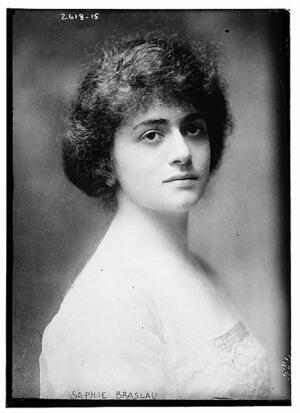Sophie Braslau
An extraordinary contralto, Sophie Braslau debuted at the Metropolitan Opera at age eleven. Originally, Braslau trained to become a concert pianist and studied at the Institute of Musical Art. The voice teacher A. Buzzi-Pecci heard Breslau humming during piano practice, decided she had operatic potential, and took her on as a pupil. Breslau auditioned at the Metropolitan Opera and won a five-year contract, debuting on stage in 1913. She was praised for her title role at the premiere of Shanewis in 1918 and performed in all the classic operas in English, Russian French, German, and Italian before she retired from opera in 1920. She then began a career as a soloist and recording artist, until a year before her death at age thirty-three from illness.
Article
Sophie Braslau was a leading contralto who debuted at the Metropolitan Opera in New York at age eleven.
She was born in New York City on August 16, 1902, the daughter of Dr. Abel and Alexandra (Goodelman) Braslau. Her parents, both from Russia, recognized early on the musical talent of their only child. Her father was on friendly terms with many musicians and often hosted visiting virtuosi. Sophie Braslau acknowledged that her musical inspiration came from a performance by soprano Alma Gluck at the old Mendelssohn Hall.
Her early musical training, which began at age five, was directed to becoming a concert pianist. She graduated from the Institute of Musical Art and continued under the training of Alexander Lambert, noted sponsor of young musical geniuses.
Signor A. Buzzi-Pecci, a voice teacher, who was often a visitor at the Braslau home, heard Sophie humming during piano practice. At the maestro’s request, she sang, and he exclaimed, “Ah, here you have a contralto of operatic caliber, doctor, without knowing it.” She studied three years with Buzzi-Pecci, then with Madame Marcella Sembrich, Gabriele Sibella, Herbert Witherspoon, Mari Marafioti, and others.
When she auditioned at the Metropolitan Opera with a group of seventeen other hopefuls, she won instant recognition and was granted a five-year contract.
She made her first appearance in a minor, off-stage voice role in Parsifal in 1913. Her real debut at the Metropolitan Opera House in New York occurred on November 28, 1913, when she sang the role of the Tsarevitch Feodora in Mussorgsky’s Boris Godunov. The following year, she performed the part of Mercedes in the revival of Carmen that Toscanini conducted in 1914. She performed in Leoni’s L’Oracolo, Zandonai’s Francesca da Rimini, Mozart’s Die Zauberflöte, and Rimsky-Korsakov’s Le Coq d’Or. She was lauded for her title role at the Met on March 23, 1918, in the world premiere of the opera Shanewis by Charles Wakefield Cadman. Her repertoire included all the standard operas in English, Russian, French, German, and Italian. She retired from opera in 1920.
Sophie Braslau was also part of the so-called Victor Quartet, which made operatic recordings. Her Yiddish records “Eli, Eli” (which was also popularized by Belle Baker) and “Yahrzeit” sold for $1.75 each in 1921. By 1926, she had toured the United States at least five times, appearing as a soloist with various symphony orchestras and at leading music festivals. She sang at fund-raisers such as the Omaha Hebrew Club campaign in 1921 to raise money for Jewish war sufferers. She toured Canada and the principal cities of Europe. Her last appearances were with the Philharmonic Society of New York in 1934.
She died on December 22, 1935, at age thirty-three. She had been ill for almost two years and bedridden for six months. Her eulogy was read by Olin Downes, the music critic of the New York Times. Among the honorary pallbearers were fellow musicians Sergey Rachmaninoff, Jascha Heifetz, Fritz Reiner, and José Iturbi.
AJYB 24:124, 38:426.
BEOAJ; Braslau, Sophie. Manuscript collection. Brooklyn Public Library, and Papers. Music Division, New York Public Library.
DAB 1.
NAW; Obituary. NYTimes, December 23, 1935, 19:1.
UJE.
WWIAJ (1926, 1938).
WWWIA 1.




